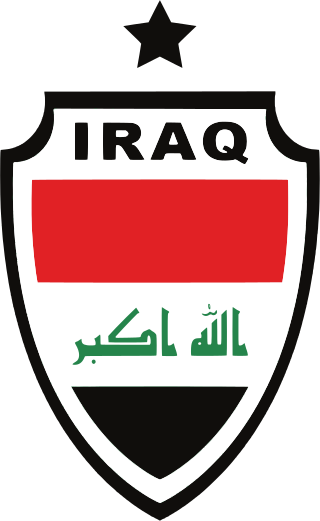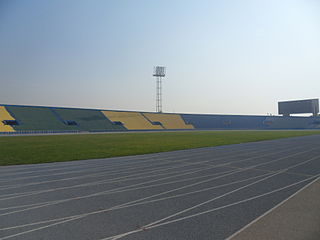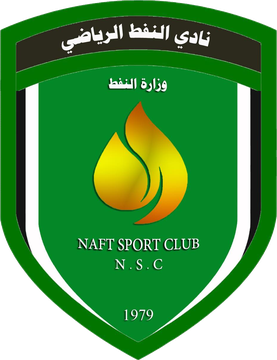Related Research Articles

The Iran–Iraq War, also known as the First Gulf War, was an armed conflict between Iran and Iraq that lasted from September 1980 to August 1988. Active hostilities began with the Iraqi invasion of Iran and lasted for nearly eight years, until the acceptance of United Nations Security Council Resolution 598 by both sides. Iraq's primary rationale for the attack against Iran cited the need to prevent Ruhollah Khomeini—who had spearheaded the Iranian Revolution in 1979—from exporting the new Iranian ideology to Iraq. There were also fears among the Iraqi leadership of Saddam Hussein that Iran, a theocratic state with a population predominantly composed of Shia Muslims, would exploit sectarian tensions in Iraq by rallying Iraq's Shia majority against the Baʽathist government, which was officially secular and dominated by Sunni Muslims. Iraq also wished to replace Iran as the power player in the Persian Gulf, which was not seen as an achievable objective prior to the Islamic Revolution because of Pahlavi Iran's economic and military superiority as well as its close relationships with the United States and Israel.

Saddam Hussein was an Iraqi politician and revolutionary who served as the fifth president of Iraq from 1979 to 2003. He also served as prime minister of Iraq from 1979 to 1991 and later from 1994 to 2003. He was a leading member of the revolutionary Arab Socialist Ba'ath Party and later its Iraqi regional branch. Ideologically, he espoused Ba'athism, a mix of Arab nationalism and Arab socialism, while the policies and political ideas he championed are collectively known as Saddamism.

The Gulf War was an armed conflict between Iraq and a 42-country coalition led by the United States. The coalition's efforts against Iraq were carried out in two key phases: Operation Desert Shield, which marked the military buildup from August 1990 to January 1991; and Operation Desert Storm, which began with the aerial bombing campaign against Iraq on 17 January 1991 and came to a close with the American-led liberation of Kuwait on 28 February 1991.
This is a list of aviation-related events from 1985.

The Iraq national football team represents Iraq in men's international football and is controlled by the Iraq Football Association (IFA), the governing body for football in Iraq. Iraq's usual home venue is the Basra International Stadium.
The tanker war, part of the larger Iran–Iraq War, was a series of military attacks by Iran and Iraq against merchant vessels in the Persian Gulf and Strait of Hormuz from 1984 to 1988.

Al-Shaab International Stadium is an all-seater multi-purpose stadium in Baghdad, Iraq. The 35,700-seater was the home stadium of the Iraq national football team, as well as the largest stadium in Iraq, from its opening on 6 November 1966 until the Basra International Stadium was opened in 2013. It is owned by the government of Iraq.

The Iraq War, sometimes called the Second Gulf War, was a protracted armed conflict in Iraq from 2003 to 2011. It began with the invasion of Iraq by the United States-led coalition that overthrew the Ba'athist government of Saddam Hussein. The conflict continued for much of the next decade as an insurgency emerged to oppose the coalition forces and the post-invasion Iraqi government. US troops were officially withdrawn in 2011.

Al Naft Sports Club is an Iraqi professional sports club based in the Adhamiyah District, East Districts of the Tigris River, Baghdad. Their football team plays in the highest division in Iraq which is the Iraq Stars League, which they have never been relegated from.

Iraq, officially the Republic of Iraq, is a country in West Asia and a core country in the geopolitical region known as the Middle East. With a population of over 46 million, it is the 35th-most populous country. A federal parliamentary republic, it consists of 18 governorates. Iraq is bordered by Turkey to the north, Saudi Arabia to the south, Iran to the east, the Persian Gulf and Kuwait to the southeast, Jordan to the southwest, and Syria to the west. The capital and largest city is Baghdad. Iraqi people are diverse; mostly Arabs, as well as Kurds, Turkmen, Yazidis, Assyrians, Armenians, Mandaeans, Persians and Shabakis with similarly diverse geography and wildlife. Most Iraqis are Muslims – minority faiths include Christianity, Yazidism, Zoroastrianism, Mandaeism, Yarsanism and Judaism. The official languages of Iraq are Arabic and Kurdish; others also recognized in specific regions are Turkish, Suret, and Armenian.
Adnan Hamad Majid Al-Abbassi is an Iraqi football manager and former player.

Babylon was an ancient city located on the lower Euphrates river in southern Mesopotamia, within modern-day Hillah, Iraq, about 85 kilometers south of modern day Baghdad. Babylon functioned as the main cultural and political centre of the Akkadian-speaking region of Babylonia. Its rulers established two important empires in antiquity, the 19th–16th century BC Old Babylonian Empire, and the 7th–6th century BC Neo-Babylonian Empire. Babylon was also used as a regional capital of other empires, such as the Achaemenid Empire. Babylon was one of the most important urban centres of the ancient Near East, until its decline during the Hellenistic period. Nearby ancient sites are Kish, Borsippa, Dilbat, and Kutha.

Ba'athist Iraq, officially the Iraqi Republic (1968–1992) and later the Republic of Iraq (1992–2003), was the Iraqi state between 1968 and 2003 under the rule of the Arab Socialist Ba'ath Party. This period began with high economic growth, but ended with the country facing severe levels of socio-political isolation and economic stagnation. By the late 1990s, the average annual income had decreased drastically due to a combination of external and internal factors. UNSC sanctions against Iraq, in particular, were widely criticized for negatively impacting the country's quality of life, prompting the establishment of the Oil-for-Food Programme. The Ba'athist period formally came to an end with the 2003 invasion of Iraq, and the Ba'ath Party has since been indefinitely banned across the country.
Basim Qasim Hamdan Al-Suwaid is an Iraqi football manager and former player who is currently the manager of Al-Talaba SC.

Ahmed Radhi Humaiesh Al-Salehi was an Iraqi footballer who played as a striker. Nicknamed "The Magician" in his playing days and regarded as one of Iraq's and Asia's best players of all time, Radhi scored the only Iraqi goal at the FIFA World Cup in its 1986 edition, a low shot to the corner of the net against Belgium in a 2–1 defeat. He was voted the Asian Footballer of the Year in 1988.
Salih Mahdi Ammash was an Iraqi historian, writer, author, poet and Iraqi Regional Branch politician and Iraqi army officer who sat on the Regional Command from 1963 to 1971.

The Iraqi Super Cup, previously called Iraqi Perseverance Cup, is Iraqi football's annual match contested between the champions of the previous Iraq Stars League season and the holders of the Iraq FA Cup. If the Stars League champions also won the FA Cup then the league runners-up provide the opposition. The fixture is a recognised football super cup. Extra-time is not played in the case of a draw; the game goes straight to penalties instead.

Al-Rasheed Sports Club was an Iraqi sports club based in Karkh, Baghdad. Its professional football team played in what is now known as the Iraq Stars League, the top tier of the Iraqi football, from 1984 until 1990. The club's home stadium was Al-Rasheed Stadium.
